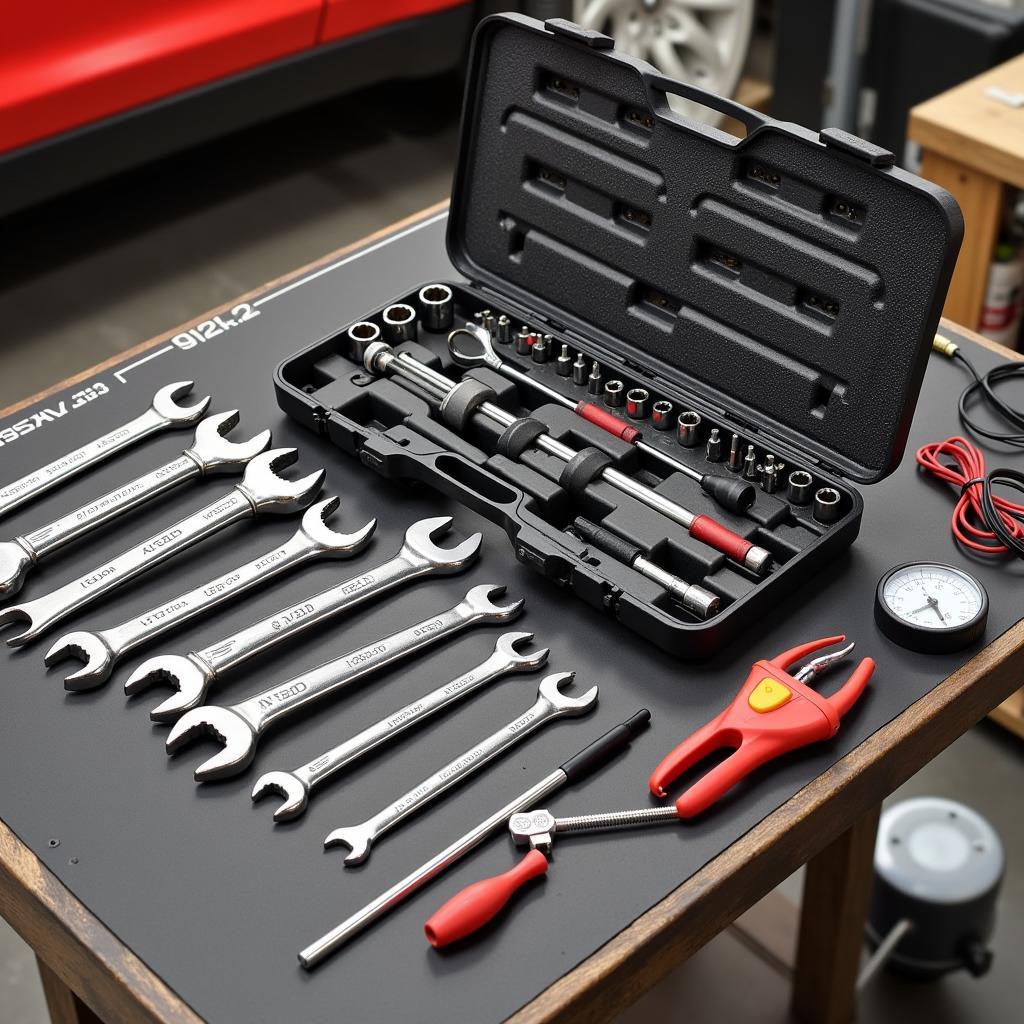Knowing what basic things you need for car and bike repair can save you time, money, and frustration. Whether you’re a seasoned DIYer or just starting out, having the right tools and understanding some fundamental principles is essential for tackling common maintenance and repair tasks. This article will cover the essential tools, basic knowledge, and safety precautions you’ll need to get started with car and bike repair.
Essential Tools for Car and Bike Repair
Having the correct tools is crucial for effective repairs. Here are some must-haves for any aspiring mechanic:
- Wrenches: A set of combination wrenches (both open-end and box-end) in various sizes is a cornerstone of any toolkit. Metric and SAE are both necessary depending on the vehicle.
- Sockets and Ratchet: Socket sets allow you to loosen and tighten bolts and nuts in tight spaces. Invest in a good quality ratchet and a variety of socket sizes and extensions.
- Screwdrivers: Phillips and flathead screwdrivers in various sizes are indispensable for removing screws and fasteners.
- Pliers: Needle-nose pliers, slip-joint pliers, and locking pliers are all useful for gripping, bending, and cutting wires and other small components.
- Jack and Jack Stands: Safely lifting your car or bike is essential for many repairs. Never work under a vehicle supported only by a jack. Always use jack stands for safety.
- Tire Pressure Gauge: Maintaining correct tire pressure is crucial for safety and fuel efficiency.
- Multimeter: A multimeter helps you diagnose electrical problems by measuring voltage, current, and resistance.
- Work Light: A bright work light is essential for seeing clearly in tight spaces and under the vehicle.
 Essential Car and Bike Repair Tool Kit
Essential Car and Bike Repair Tool Kit
Basic Knowledge for Car and Bike Repair
Beyond tools, understanding some basic automotive principles is essential:
- How an Engine Works: Familiarize yourself with the basic components and operation of an internal combustion engine.
- Electrical Systems: Understanding basic electrical principles will help you diagnose and troubleshoot electrical issues.
- Brake Systems: Knowing how brakes work is crucial for safe operation and maintenance.
- Tire Changes: Learning how to change a tire is a fundamental skill for any driver.
- Fluid Changes: Regularly changing engine oil, coolant, and brake fluid is vital for maintaining vehicle health.
Safety First: Precautions for Car and Bike Repair
Safety should always be your top priority when working on vehicles.
- Work in a Well-Ventilated Area: Exhaust fumes and other chemicals can be hazardous.
- Wear Safety Glasses and Gloves: Protect your eyes and hands from debris and chemicals.
- Disconnect the Battery: Before working on any electrical components, disconnect the negative battery terminal to prevent shocks.
- Use the Right Tools for the Job: Using the wrong tools can damage components and cause injury.
- Consult a Repair Manual: Always refer to a vehicle-specific repair manual for detailed instructions and safety procedures.
What Basic Things Are Needed for Specific Repairs?
Different repairs require different tools and knowledge. Here are a few examples:
Brake Pad Replacement
Requires wrenches, sockets, a C-clamp, and knowledge of brake systems.
Changing a Tire
Requires a jack, jack stands, a lug wrench, and knowledge of how to safely lift and lower a vehicle.
Oil Change
Requires a wrench, an oil filter wrench, a drain pan, and knowledge of how to dispose of used oil properly.
Conclusion
Knowing What Are Basic Things Need For Car And Bike Repair empowers you to take control of your vehicle maintenance. By investing in the right tools, acquiring essential knowledge, and prioritizing safety, you can save money, increase your self-sufficiency, and enjoy the satisfaction of working on your own vehicles. Remember to always consult a repair manual for specific instructions and safety precautions before attempting any repairs.
FAQs
- What is the most important safety precaution when working on a car? Disconnecting the battery.
- What are the basic tools needed for most car repairs? Wrenches, sockets, screwdrivers, and pliers.
- Why is it important to use jack stands? To prevent the vehicle from falling and causing injury.
- What should I do if I’m unsure how to perform a repair? Consult a repair manual or a qualified mechanic.
- Where can I find reliable information about car repair? Vehicle-specific repair manuals and reputable online resources.
- What are some basic electrical tools needed for car repairs? Multimeter and test light.
- What kind of safety gear should I wear? Safety glasses and gloves.
Common Car Repair Scenarios
- Flat tire: Learn how to safely change a tire on the side of the road.
- Dead battery: Familiarize yourself with jump-starting procedures.
- Overheating engine: Understand the causes of overheating and appropriate responses.
Related Articles
- Understanding Your Car’s Electrical System
- A Beginner’s Guide to Brake Repair
- Essential Car Maintenance Tips
Need help? Contact us on WhatsApp: +1(641)206-8880, or Email: [email protected]. Our customer support team is available 24/7.

